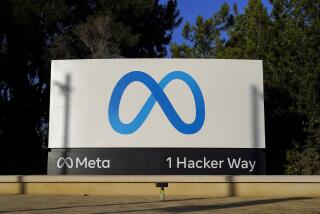If a Vizio TV spied on what you watch, you might be in line for a cash payout
- Share via
If your Vizio television spied on you over the last several years, you could receive a payout of $1.12 — or perhaps as much as $31 — under the terms of a proposed settlement of a consumer lawsuit against the Irvine TV manufacturer.
The case stems from a 2015 report by ProPublica that found the company’s smart TVs tracked customers’ viewing habits and shared that data with advertisers. Since then, Vizio has faced several lawsuits, including one that the company settled for $2.2 million with the Federal Trade Commission in February 2017.
The $1.12 payout under the latest litigation is based on the assumption that all 16 million affected consumers will apply for a claim from a $10-million settlement fund, a conservative estimate of the amount that would be left over after fees and expenses.
The lawyers representing Vizio customers said in court documents, however, that a more realistic assumption is that 5% of the class files a claim. That would mean each person receives $13, while court documents pegged the payout as high as $31.
The attorneys are seeking a total monetary settlement of $17 million, with the named plaintiffs receiving $5,000. The two California law firms that handled the case can seek up to 25% of the total settlement value — the $17 million, as well as an additional, still-undetermined sum.
The settlement would resolve a federal lawsuit seeking class-action status that was filed against Vizio in December 2016 in Santa Ana. It alleged that the company collected and shared viewing data from Vizio smart TVs without consumers’ consent or knowledge.
As part of the settlement, Vizio said it has stopped tracking viewer data unless the customer opts in and will delete any of the remaining data it collected.
The proposed settlement must still be approved by the court along with the case’s class-action status. Vizio said in a statement that it has agreed to resolve claims relating to its “pre-2017 data practices, with the goal of resolving all outstanding lawsuits.” The company said that it enacted “clear, prominent and explicit” viewing data disclosures early last year.
The settlement values the data collected about each Vizio customer at 62 cents in the unlikely case that all of them apply for compensation. The lawyers described the per-person settlement figures as “highly favorable” based on estimates from a hired expert that “average damages for actual harm” from gathering and sharing viewing data is 78 cents to $4.76.
Court documents also listed other, similar consumer privacy cases in which the number of claimants was so high that the courts determined that the tiny amount of compensation could not “feasibly be distributed” to class members.
Affected individuals do not need to submit a receipt as part of a claim, and can choose to receive payment via check or through an electronic payment system such as PayPal.
A 45-second notice of the settlement will be broadcast to 6 million Vizio smart TVs purchased by affected consumers. The notice, which will include the settlement website “in the center of the screen and in large font,” will appear on the screen three times, most likely when the TV is turned on, according to the proposed settlement. Nine million potential class members will also receive an email about the settlement.
The February 2017 FTC lawsuit similarly alleged that the company was gathering and selling data on consumers’ locations, demographics and viewing habits.
Twitter: @smasunaga
UPDATES:
2:40 p.m.: This article was updated with a comment from Vizio.
This article was originally published at 1:45 p.m.
More to Read
Inside the business of entertainment
The Wide Shot brings you news, analysis and insights on everything from streaming wars to production — and what it all means for the future.
You may occasionally receive promotional content from the Los Angeles Times.











